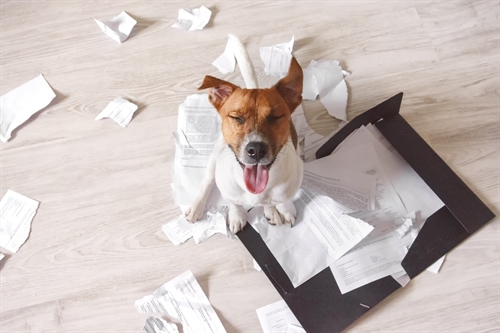Paper clutter gobbles up space in your home and causes an administrative nightmare. Decluttering experts advise a simple routine to keep your papers in order. Essentially, file papers as they arrive and get rid of them when you no longer need them.
The filing is easy – there are plenty of systems to choose from. There are some documents that you need to keep to hand. These are best stored at home in a filing cabinet. And there are some papers that you don’t need to access regularly but need to keep either forever or for a limited period. You can save valuable space at home by putting long-term paperwork into storage. If papers are to be disposed of eventually, mark the box or folder with a disposal date so that you can move them on when the time comes. Our post on storing your family history has some hints about looking after papers .
Getting rid of paper is more tricky. It’s common to get stuck because you can’t work out what documents to keep and what to recycle (or shred). This problem is easily resolved: all you need is a handy list telling you how long to keep each type of paperwork.
Household
Utility bills
Keep for one year so that you can track what you use.
Warranties and guarantees
Keep warranties until they expire – note the expiry date on the page so you know when it’s safe to shred or recycle them.
Receipts
Keep important receipts for six years in case you need to return the item.
Insurance docs
Keep insurance certificates until you renew or change your policy.
Personal
Certificates and evidence of qualifications
Keep forever: take pride in your achievements. You may need training certificates and awards when applying for a job or if you need to prove your qualifications. Of course, if you end up with an unmanageable file, you can weed out expired qualifications and your good handwriting certificate and your ping-pong tournament participation award!
Medical information
Keep medical notes for the rest of your life as you may need to refer back in future – but you are generally safe to recycle things like out-dated patient information leaflets.
Identification documents
Birth certificates are a lifelong document, and marriage certificates last as long as the marriage – although you can pay to get copies . Driving licences expire when you reach seventy and need to be renewed. Cancelled passports with unexpired visas should be kept securely with your new passport – but consider destroying old passports as protection against identity theft.
Wills
Wills can be kept at home, in storage or lodged with your solicitor, your bank or a company that stores wills. Let your loved ones know where they can find your will in the event of your death.
Finance
Bank statements and credit card bills
Keep the last three months-worth of bank statements and credit card bills. If you need information from further back, you can get it online or by asking your bank.
Investment information
Keep for as long as it is relevant.
Tax-related paperwork
For those who do a self-assessment for a personal tax return, HMRC requires you to keep paperwork related to your tax return for at least 22 months after the end of the tax year it relates to. There are other rules about tax paperwork for small businesses.
Payslips
Keep payslips until you get your annual P60 . Your P60 should be, at a minimum, kept for six years – but it is worth hanging on to them because they may be relevant when you claim your pension. Keep your P45s, too: they cannot be replaced and you will need them when you start your next job. P45s are also a handy record of your employment history. If you do a tax return, if you need to claim benefits or if you are taking out a loan or mortgage, you will need some recent payslips and your P45 and P60.
Now you know what paperwork to keep and what to shred, storing and decluttering your documents is easy.




